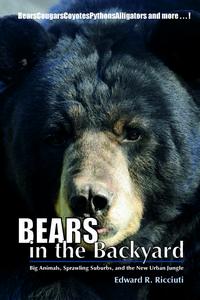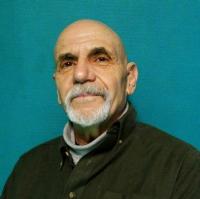Edward Ricciuti: Bears in the Backyard
BIG ANIMALS, SPRAWLING SUBURBS, AND THE NEW URBAN JUNGLE
Edward R. Ricciuti
Countryman Press, May 26, 2014, $23.95 U.S., $26.95 Canada
ISBN 978-1-58157-217-9
Ricciuti reports:
Although this book was written last year, its approach and content began to evolve in my mind during the 1970s, when I started writing about how a few pioneering species of wildlife were reclaiming suburbs and cities.
Back then, savvy wildlife managers shopping around their research grant proposals realized that “urban wildlife” was a new buzzword that increased chances of funding. Savvy conservation writers quickly picked up that queries including this phrase also caught the attention of editors.
I became increasingly interested in urban wildlife as I began to explore the impact of human attitudes towards animals on conflict between people and wild creatures. I wrote frequently about how many so-called “nature shows” morphed animals into people in furry coats, to the detriment of wildlife conservation. Similarly, I described how the extreme factions of the animal rights movement worked against the wild creatures they purported to defend by opposing scientific wildlife management.At first, urban wildlife meant raccoons and possums but, before long, bigger, badder beasts began to appear in human population centers. Mountain lions, bears, and other large creatures began showing up in the backyards and on streets of suburbs and cities. Fang and claw had hopped the white picket fence, unnerving soccer moms and municipal officials no end.
Realizing a new societal and zoogeographic phenomenon was occurring — one that could trigger interaction between humans and potentially dangerous wildlife to a degree never before experienced — I began to keep records and conduct field observations.
Meanwhile, I was developing credits for investigating and writing about the impact of socio-economic forces on wildlife conservation, which led to assignments that enabled me to examine human-wildlife relationships around the globe. I developed perspective about the problems villagers in Zimbabwe had with elephants and those Westchester County, NY suburbanites had with deer. Last year, I put together a proposal, found an agent who liked it, and a publisher who bought it. Then I wrote it.
Contact info:
- Edward Ricciuti 860-663-1804, edricciuti@comcast.net, www.edwardricciuti.com
- Publicist: Kermit Hummel, 802-457-4826, khummel@wwnorton.com
- Agent: Roger S. Williams, 860-973-2439, roger@nepa.com
NASW members: will your book be published soon? Take advantage of this opportunity for shameless self-promotion.
Tell your fellow NASW members tell how you came up with the idea for your book, developed a proposal, found an agent and publisher, conducted research, and put the book together. Include what you wish you had known before you started working on your book, or had done differently.
See https://www.nasw.org/advance-copy-submission-guidelines.
Send info and images to Lynne Lamberg, NASW book editor, llamberg@nasw.org.


